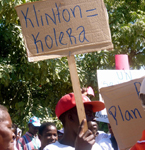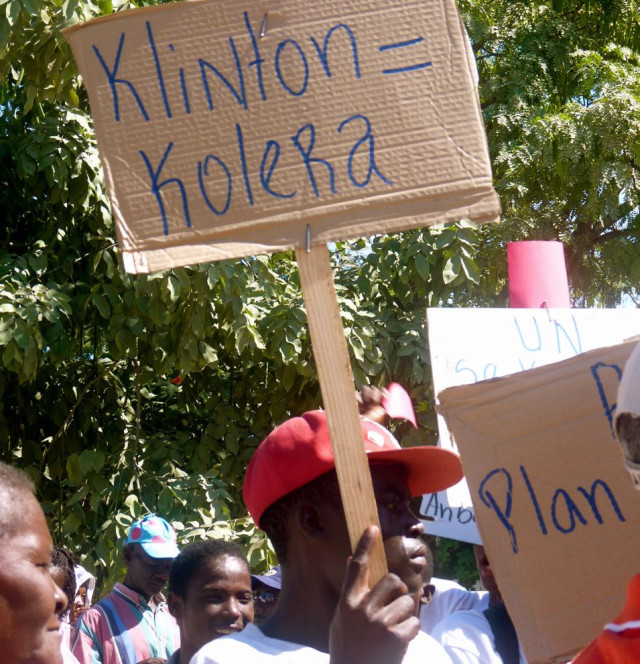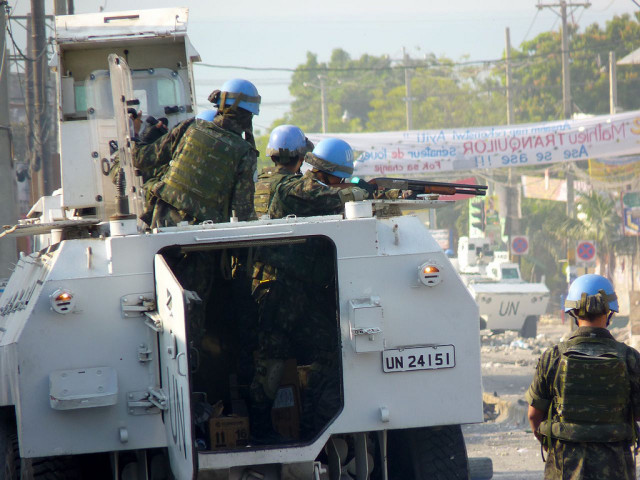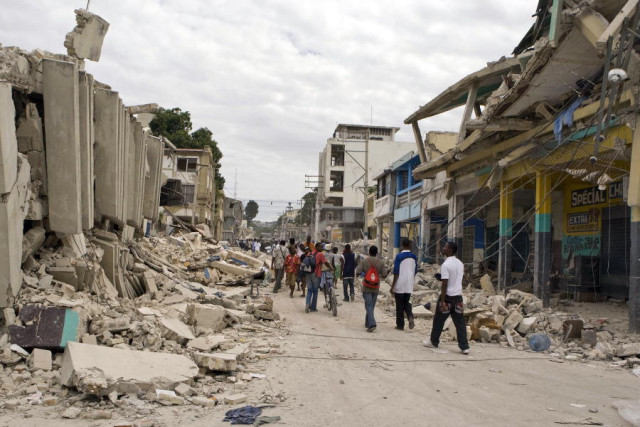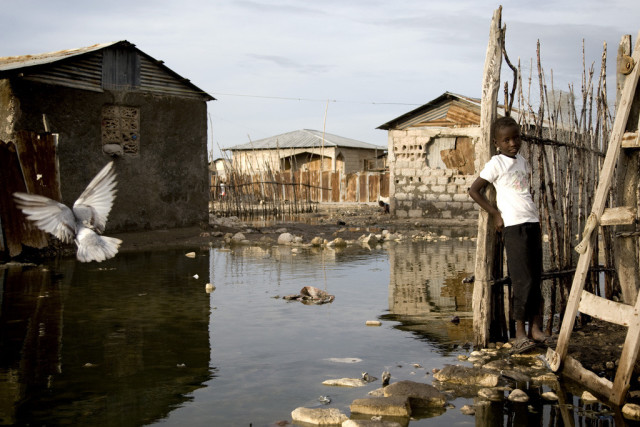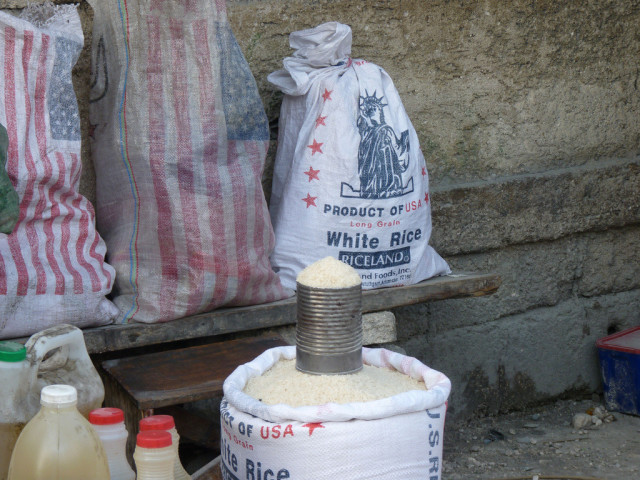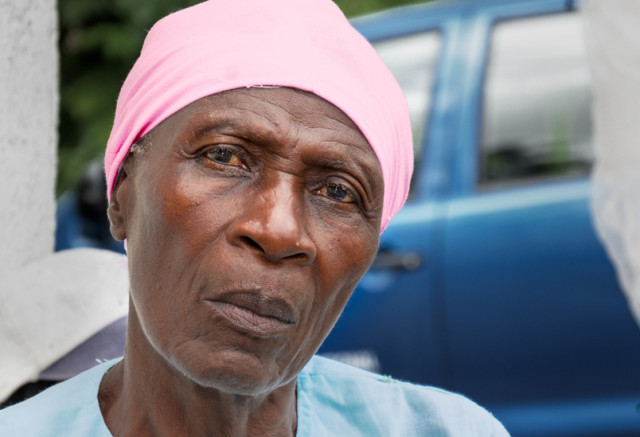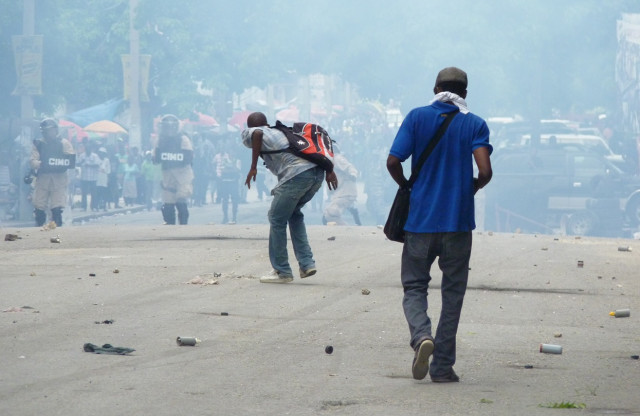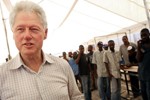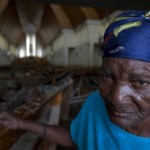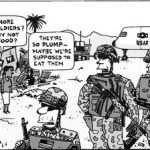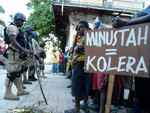Earthquake Coup and Cholera Elections
Dady Chery Talks to Anita Stewart About Haiti – Part 2
The following interview is part 2 of a three-part series on Challenging the Rhetoric on August 26-28, which was originally broadcast on Wise Women Media on August 5, 2015. Dady Chery discusses topics in which she delves in her new book, We Have Dared to Be Free: Haiti’s Struggle Against Occupation, published by News Junkie Post Press. For the audio, scroll to the end of this transcript.
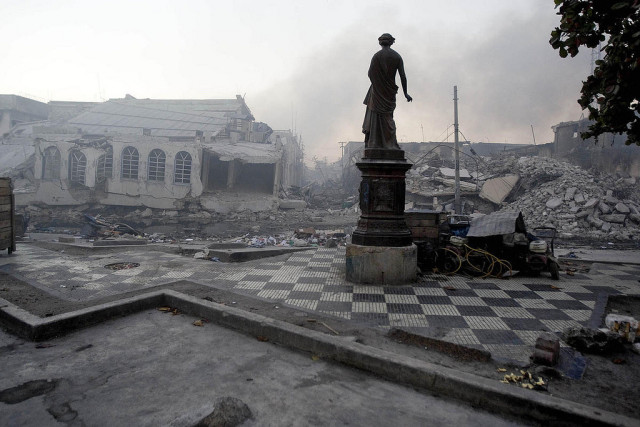 Anita Stewart: I went to Twitter to try to get some recent news about Haiti, and I noticed, of course, that Regine Chassagne is there with Arcade Fire…. The other person who was on the same panel today was Chelsea Clinton. She is actually there working, I guess, on behalf of her father, doing work down there for the NGOs.
Anita Stewart: I went to Twitter to try to get some recent news about Haiti, and I noticed, of course, that Regine Chassagne is there with Arcade Fire…. The other person who was on the same panel today was Chelsea Clinton. She is actually there working, I guess, on behalf of her father, doing work down there for the NGOs.
Dady Chery: It’s a sort of humanitarian imperialism: they’re going to help you whether you like it or not. Now, if Haitians really had a choice, would they really choose to have a bunch of foreigners come to the country to do what they like? I don’t think so. I think that’s the bottom line. These people are not wanted, but they have basically taken all the jobs. To get work in Haiti now, you essentially have to work for an NGO. Hospitals have fallen apart, all sorts of structures have fallen apart and been replaced by NGOs. You have this very large number of NGOs in Haiti. Right now… it’s not one NGO person but one NGO per 1,000 Haitians. At the peak, it was one NGO per 500 Haitians, right after the earthquake. You look around, and it gets worse all the time. As their numbers are increasing, things are getting worse. Ultimately, if Haitians are going to have a choice. If Haitians are going to have a democratic government, then the NGOs will have to abide by rules. They’re going to have to give whatever help they give within the constraints that are imposed on them by the people that they’re helping. They cannot just come and do whatever they like. One example: an NGO decided to set up a cholera clinic right next to a school in a town called Saint-Marc. The people in the town were in an uproar: throwing rocks at them, wouldn’t have it. There were huge protests. So what did the NGO do? It was actually MSF. They called MINUSTAH, the UN forces, to make sure that the protests were put down, and then they said: we’re going to explain it all to you. You really don’t understand. There’s really no risk to any of the stuff we’re doing…. People should be able to say: we don’t want this help. We do not want your cholera clinic here. And that should be that.
AS: It’s like, instead of the people having people rule, they have no voice in the government at all!
DC: And the NGOs, however well meaning they may appear, at the base of it, they are really imperialist. They believe that it’s okay to impose their will on the “ignorant natives.” Ultimately, that is what they’re doing. That is their thinking. There’s really no respect there.
AS: Let’s talk about the money. Now there was a lot money that was collected after the earthquake from people all over the world, but so much from the United States! Do you have any idea on what that figure would have been?
DC: It was billions… I’ve seen figures anywhere between $9 and $13 billion.
AS: So it would have been money when they were doing Red Cross commercials, people giving through their churches. They were making appeals: give $25, give $5 if that’s all you’ve got…. All these well-meaning people who thought that their money was going to help the Haitian people. Can you tell me what’s been done with that money?
DC: There was tremendous good will after the earthquake. This is good will that’s been earned by Haitians because of the way they conduct themselves in the United States. People who had had contact with Haitians who work in hospitals, who are nurse’s aids, who take care of their parents in nursing homes, etc. Everybody wanted to help…. One out of two American adults actually donated for Haiti. It was completely extraordinary: an astounding amount of money. Instead of helping Haiti, it just attracted these incredibly predatory elements. The idea was: well, the government is corrupt, and we’re going to come in and take care of things because we’re not corrupt. But actually, I’m not too sure of that. Yes, it’s true that there was plenty of corruption in the government, but if you look at local government, for example, people in the local government are people who are very well known in their towns and very well respected. Since the earthquake, this new federal government has actually done away with the local governance. They got rid of all the mayors! They got rid of all the local judiciary! This all goes back to Clinton.
The earthquake happened on January 12, 2010. By mid-April, Clinton had the Haitian parliament voting on an 18-month state of emergency that would allow an organization formed by Clinton called the IHRC, the Interim Haiti Recovery Commission, to get 18 months of carte blanche: 18 months during which they could do anything they wanted without risk of liability so they could supposedly reconstruct the country. They were going to manage all the aid funds and reconstruct Haiti…. This gives some insights into what some people from developed countries would love to have as their ideal government.
What Clinton set up was this organization, top heavy, that would have 14 major donors. Represented among these 14 major donors would be him for the United States, the European Union, France, Canada, Brazil, Venezuela, the IDB, United Nations, World Bank, Caricom, OAS, one representative for the NGOs, one for the diaspora, and one for everybody else. These would be the 14. Then there were all sorts of other donors, and that was not even public. It was a strictly pay-to-play affair, where they had to put up $100 million or forgive $200 million of debt, and in addition contribute soldiers for the occupation.
Haiti would also be represented, but… by a prime minister who was basically hand picked by the international community, then an MP of their choice, a senator of their choice, somebody to represent the unions, somebody to represent the business community, and the judiciary, and local government. For all of these people, they would present the Clinton group with a list of names, and they’d get to pick who they wanted. That’s what was supposed to run Haiti for 18 months.
AS: So there was no election for this. This was just a collection of people. People themselves had no input. This was like an election without the people.
DC: In fact, people called it a coup d’etat.
AS: It was a monetary coup that didn’t get bloody.
DC: All of this within three months of the earthquake. Haiti was basically on its back. People were in shock, and all this was happening. In the parliament itself, they had members who had died, and they were trying to fight this…. When they didn’t succeed at fighting it — there were definitely allegations that people had been bribed to make sure there was a quorum and that it was voted on — they just took to the streets! There were massive protests that went on for months. You don’t hear about any of this in the United States, but through all of this, there has always been resistance from Haitians.
AS: I was actually watching YouTube and I saw a lot of it. I was watching the French news, foreign news reports, because it’s just so bizarre that we have this proximity to Haiti, but we get none of its news, and we have to go to news networks of Europe and other places to get information.
DC: My experience with following what’s going in Haiti very closely, is that what people call news in the United States are really campaigns. They are campaigns to get a specific reaction or to get a specific action. They’re not really news.
AS: I call it infotainment.
DC: It is!
AS: If I catch a news program and they tell me what style of shoes people are going to be wearing in the fall, to me that’s not news.
DC: Yeah, and someone’s taking about one thing, and there’s something underneath that’s describing what Rihanna has been doing lately.
AS: We talked about these NGOs, and pretty much, this is lawless.
DC: It is lawless.
AS: What is happening with the elections, because it seems like there are all these people? So who ends up being president of Haiti, and what do you think of the last leader that has been in Haiti since the earthquake?
DC: After that whole Clinton thing, there were huge protests, and to distract people from the protests, more or less, they decided to have elections. Immediately! The elections happened a few months after the earthquake and soon after the cholera epidemic. The cholera epidemic was first discovered on October 21, 2010, and there elections in November.
AS: It’s kind of like you’re sick, and you roll over, and you get out of bed,… and you end up getting even a worse flu, and you end up back in bed…..
DC: Those elections were completely ridiculous. The biggest party, Fanmi Lavalas, could not participate. This is a party that commanded 80 percent of the electorate… More than 80 percent of people boycotted the elections. They wound up with about 20 percent of people voting. After the first round, they didn’t get the right people, and so one person was thrown out, and another one was thrown in and he wound up becoming president. The presidential choices: they were both people who were going to continue to allow the state of emergency, accept the UN presence, and basically do whatever the international community wanted them to do. They were supposed to be good Vichy presidents.
AS: So they were just figureheads… who would carry out the status quo.
DC: Yes.
AS: Tell me a little bit about the cholera epidemic. That seemed to be a very serious thing. As usual, we didn’t hear very much about it here. I knew some people who were going down there, who were doing relief work that was medical. That is how I knew about it. Without revealing too much that’s in the book, can you tell me what happened, because that puts the blame on UN people?
DC: In summer 2010, about 1,280 Nepalese soldiers, the biggest Asian contingent of UN troops, were sent back to Nepal, to Kathmandu, to train. They got there in the middle of a cholera epidemic. Not only that, but after they finished the training they got some cursory examinations and then they were given about 10 days’ home leave. After this, they were flown back into Haiti and put in three camps around a city called Mirebalais. In one of the camps, there was a septic tank that was just in an absolutely awful state and was spilling into a stream that was joining a river. That river was feeding a lot of the rice paddies. The people who go to work in the rice fields, they don’t carry a lot of stuff with them. They drink the water from there when they get thirsty. They were the first people killed. It was absolutely devastating for these people.
AS: How many people died from that epidemic?
DC: More than 8,800 so far. It was a massive number of people.
AS: How many people actually got cholera and did not die?
DC: Many hundreds of thousands. It’s probably getting close to 500,000 at this point.
AS: Half a million people got cholera and only about 9,000 died. That’s like a miracle.
DC: Actually, nobody should die of cholera. That is something that I find very upsetting. If you look at the Cuban health workers in Haiti, for example, their mortality rate for cholera patients is way lower than anybody else’s. The thing about cholera: you lose a lot of fluids, you lose a lot of salts, and what you need when you are very sick is rehydration. The only reasons for you die from cholera are if you swallow massive amounts of the bacteria, and it makes you so sick that somebody cannot get you to a hospital fast enough for you to get rehydrated.
AS: If you continue going back to that same water source that’s infected, and you don’t know that it’s infected… you put yourself in a worse situation.
DC: Really, people should not die of cholera. It’s not a fatal disease. I consider the 8,800 deaths to be deaths from neglect. I don’t think there were 8,800 cases where people were so incredibly sick that they couldn’t get taken to a hospital fast enough to save their lives.
AS: And… the fact that there were so many NGOs all over the place. There were supposed to have been enough health workers for all the people on the island. There were supposed to be.
Sources: Haiti Chery | Wise Women Media | Challenging the Rhetoric | Photographs one, four and five from United Nations Photo archive; photographs two, three, six and eight from Ansel archive and photograph seven by Blue Skyz Studios.

